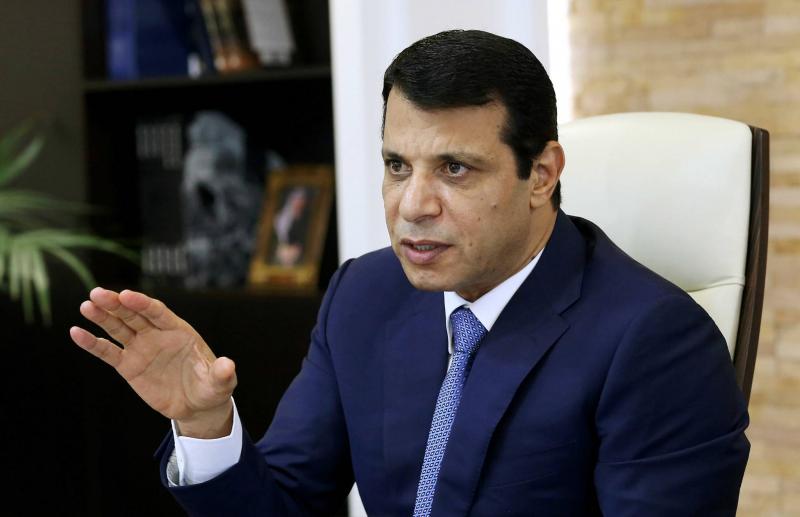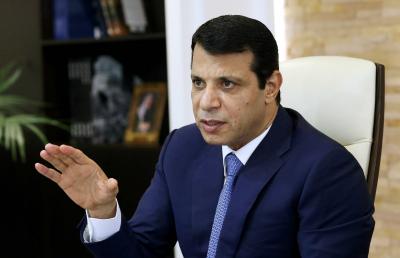Mohammad Dahlan, the former security official in Gaza, emerges as a potential option for the post-war period following Israel’s military campaign against the territory, aimed at dismantling Hamas. Dahlan states that the absence of a clear strategy for establishing a Palestinian state and ending the occupation makes it difficult for him and others to manage the devastated Gaza Strip. In an interview with Reuters in Abu Dhabi, Dahlan, a former Palestinian Authority leader, asserts that he is not seeking any official position and has no ties to any government role. Nonetheless, he expresses his commitment to supporting the Palestinian people and standing beside his community with the help of Arab relations. "I do not want any status or position in the future, but I also will not stop performing my duty, and this is clear," he says.
Dahlan attributes the lack of vision for Gaza’s future to the absence of a perspective from Israel, the US, and the international community regarding the post-war scenario, noting that Israel entered the conflict without a strategy for what occurs after the war in Gaza.
Gaza is currently experiencing unprecedented bombardment and destruction from the Israeli assault by land, sea, and air in response to attacks by Hamas on Israeli towns across the border on October 7. Dahlan believes that “the war will lead to ruin for all parties involved, and those who enter Gaza do not know how to exit.” He does not see any military achievements for Israel on the ground to date, claiming they are "only victorious over the innocent, children and the elderly, behaving as though their declared war is aimed solely at killing civilians.”
The leader, who has held prominent security positions in the Palestinian Authority and has been a significant adversary of Hamas, concludes that the issue is broader than simply Hamas, questioning, “Was Hamas alone an issue or was it that there was no Israeli government willing to consider peace with the Palestinian people?” He continues, "Today the issue is Hamas, but what will the issue be tomorrow? Let’s assume Israel manages to eliminate Hamas; will it accept a two-state solution and recognize a credible Palestinian state living alongside Israel? In my view, the answer is no; they must prove otherwise."
Previously, Dahlan took a hardline stance against Hamas, deeming their election victory a "catastrophe." However, he claims now, "I am not a supporter of Hamas and have significant fundamental disagreements with them, but to justify torturing and killing children because they elected Hamas in the past is a shame on Israel.”
Dahlan references documents from 1948 to underscore Israel’s ideology of displacement, stating, "The documents leaked by intelligence, parties, or the finance minister indicate they do not want the Palestinian people in Palestine; the idea of displacement and ethnic cleansing has been an ideological standpoint of Zionism since 1948." He believes the Palestinian people remain steadfast against displacement: "Despite all the oppression, exploitation, and weaponry... the Palestinian people, in their poverty, hunger, and without electricity, water, or medicine, remain resilient amidst the rubble of their homes."
Dahlan does not believe that the idea of displacement is feasible, whether toward Sinai or Jordan. In his early sixties, he rose through the ranks of the Fatah movement to become a member of its Central Committee before clashing with President Mahmoud Abbas. Dahlan formed a new faction within Fatah called the “Reformist Current,” gaining some followers, especially from Gaza, while Fatah under Abbas pursued any who appeared to have joined this faction.
Some view Dahlan as having ambitions to return to Palestinian territories and consider him a potential successor to Abbas.
In his assessment of the situation, Dahlan insists that Israel has no military accomplishments to present to its society, stating, “The military conflict began and ended on October 7 in disgrace.” He claims, "What follows October 7 is retaliatory action by Israel and its supporters; everything happening now and in the near future will not be in their favor, and it will be an ethical disgrace for anyone who supported Israel in this wrongdoing. This support for Israel's killing of civilians implicates the Israeli people and government as there is no way out but peace."
Regarding the future of this conflict, Dahlan confirms that Palestinians do not seek a final battle with the occupation, but rather, “The solution is for the occupation to withdraw from the West Bank, Gaza, and East Jerusalem... We are a people who will not concede, no matter the cost.”
Dahlan believes the future Palestinian generations will play a crucial role in crafting solutions. He calls for the cessation of the war followed by a serious discussion around the two-state solution, asserting that those who think escalating the occupation in Gaza will lead to a resolution are mistaken. “The current generation in Palestine, if they do not see hope for independence, freedom, and a decent life, will be a thousand times harsher than what we have witnessed.”
He concludes his assessment by stating, "If they do not work toward a two-state solution, let them drown in the sands of Gaza."




